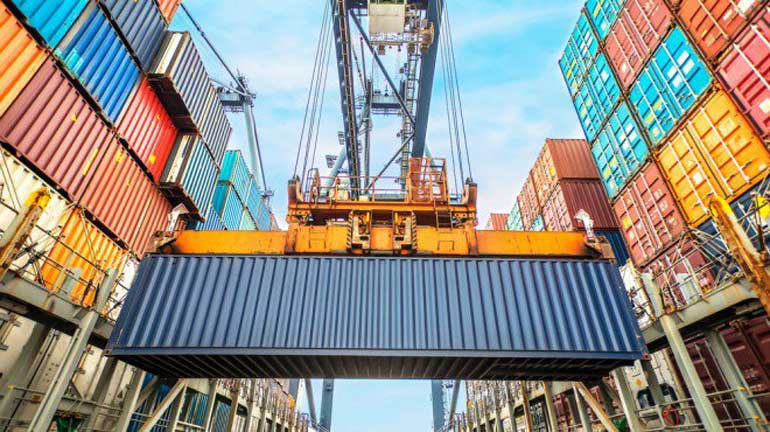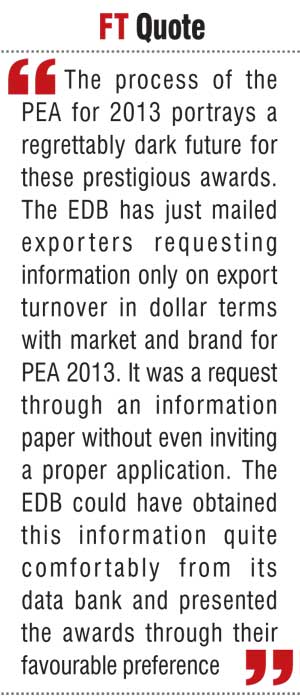Wednesday Feb 18, 2026
Wednesday Feb 18, 2026
Monday, 14 December 2015 00:00 - - {{hitsCtrl.values.hits}}

The Sri Lankan business community is impressed to hear of the ceremonial event being held to present Presidential Export Awards (PEA) for 2010, 2011, 2012 and 2013 organised by the Sri Lanka Export Development Board (EDB) on 16 December at Nelum Pokuna under the patronage of President Maithripala Sirisena.
It was on 28 June 2011 that this event (18th Presidential Export Awards Ceremony) was held last. Since the recipients of the PEA awards for these years were selected during the rule of the previous Government, it was former President Mahinda Rajapaksa who was to present the awards. But the politically appointed management of the previous Government itself was derelict in its duty and failed to organise this ceremonial presentation of prestigious awards at the correct time. However, this lends credence to the incumbent Government for the courageous efforts it exerted to celebrate this gracious occasion.
It is essential to have a meaningful discussion about these awards this time as the selection criteria of awards for 2010, 2011, 2012 and 2013 displayed a removal of key areas of significant value.
Subsequently, selection for 2013 was decided only on the basis of export values collected from export companies as per the application. In view of this miscalculated policy adopted on deciding the suitability of the best exporters, a question arises if the highest qualified exporters are honoured by this prestigious award.
The Presidential Export Award is the highest prestigious award presented in recognition of the professional competence exhibited by the export community in boosting the national economy. This award recognises their demanding progression and outstanding achievements in the export development trade. This award symbolises national recognition of individuals or organisers excelling in the performance of export business - particularly in non-traditional products and services - who are an inspiration to exporters to explore their skills in achieving similar accomplishments in the export business.
The outstanding value of the Presidential Export Awards presented to the award-winners is the Certificate of Honour signed by the Secretary to the President, a symbol of its prestige and the recognition of the entire nation.
Social economic development
In 1980, the presentation of the Presidential Export Awards (PEA) was approved by the Export Development Council of Ministers established under the Sri Lanka Export Development Act 40 of 1979 in recognition of the impressive role played by the export community for the social economic development of the nation.
In terms of this directive, the Sri Lanka Export Development Board (EDB) launched the Presidential Export Awards Scheme in 1980 to embolden exporters on an ameliorative promotion of their production.
The inaugural Presidential Export Award Ceremony was celebrated on 14 December 1981 with the presentation of nine Presidential Export Awards and 13 Certificates of Merit. During the period from 1981 to 2011, 18 Export Awards Ceremonies have been organised with nearly 200 Awards and 350 Certificates of Merit presented.
However, EDB takes pride to have maintained the high prestigious value of the PEA without any criticism during the period from 1981 to 2011.
However, this time it is a manifestation of castrating the prestige of the PEA compared to that of the past events celebrated from 1981 when a highly respected selection criteria was observed.
Data collected for 2010 and 2011 with regard to the PEA displays a huge difference compared to the previous PEA and other similar awards. Strangely, the information requested for 2010 and 2011 seem to be just primary information insufficient for any consideration. Only the export turnover with value addition, investment value and quality certificate and a number of employees had been called for.
However, only a few alternatives were added to the application for PEA 2012 by EDB merely requesting information on product development and promotional efforts after receiving various comments from outsiders.
The process of the PEA for 2013 portrays a regrettably dark future for these prestigious awards. The EDB has just mailed exporters requesting information only on export turnover in dollar terms with market and brand for PEA 2013. It was a request through an information paper without even inviting a proper application. The EDB could have obtained this information quite comfortably from its data bank and presented the awards through their favourable preference.
How can EDB decide its selection of the best exporter, best employment provider, best brand or any other awards only on exports turnover or insufficient information?
Past EDB officials have become puzzled over this sad situation which has befallen this apex institution. It is intriguing that a hidden conspiracy is trying to padlock the PEA awards scheme.
Application evaluation
 The most important part of the PEA is the evaluation of the application. Since the introduction of the PEA for the year 2009, selections were made based on multiple criteria covering the entire gamut of relative areas which are indicated below. Even the EDB website itself states this multiple criteria. It is beyond possibility to identify the correct exporter unless all aspects of entrepreneurial behaviour are analysed.
The most important part of the PEA is the evaluation of the application. Since the introduction of the PEA for the year 2009, selections were made based on multiple criteria covering the entire gamut of relative areas which are indicated below. Even the EDB website itself states this multiple criteria. It is beyond possibility to identify the correct exporter unless all aspects of entrepreneurial behaviour are analysed.
Generally the selection criteria are divided into exporters’ contribution to economic and social development with equal weight. The evaluation is done in comparison with progress of the respective year in which applications were called against the last two years’ progress.
The economic contribution part is evaluated on the increase of export turnover by deep analyses of the value addition. The other parts are the product development and market development.
Product development covers investments for expansion, new machinery, research, new design improvements, new innovation, property rights, introduction and diversification products, applying new technology, quality improvement required by international market, developing partnership, etc.
Other major conditions in the selection criteria were made on wider market promotion activities. It did not mean just a request for export value of market and brand promotion. It was necessarily a consideration of various aspects, taking into account things such as promotion of tools applied, operation of overseas branch office, warehouses, brands, partnership, recovery of lost market, entering into a new market, marketing strategies applied at difficult times even sacrificing their profit margins to protect market, market research and outcome, registration trademark abroad, etc.
It is a requirement enforced by law to protect the environment by fulfilling national requirements and every manufacturer is legally bound to respect the law. This sector evaluates separately, not under social responsibility.
Another major part of the duty expected by the nation from the business community is social responsibility. It is not only employment opportunities but also the welfare of employees through means such as medical insurance, bonus, uniform, meals, healthcare, loan facilities and many other facilities that are considered for evaluation.
This selection criterion also gives weight to Human Resources. The company is enthusiastic to invest a massive sum of money for HRD even by sending employees abroad. What is expected is that the benefits earned by the company are shared with the entire nation. Though social welfare service is rendered through other areas, it is important to identify the reality of what social benefits are.
Rural development
All governments in the past encouraged sharing the wider benefits of exports with the rural community. Exporters believe that their contribution to rural development would be beneficial for the entire nation. The selection criteria on contribution to rural development was adopted in a wider area as investments in rural areas, opening factories, encouraging high quality production, purchasing their products through a subcontract, maximising employment opportunities, sharing entrepreneurial experience, finally to help uplift the lifestyle of the rural folks.
Unfortunately, the special award given to the best exporter for rural development and contribution during the last few years has disappeared from the new agenda.
In the past, the records of each selected winners were verified with Customs, the EPF office and all other relevant authorities to arrive at a crystal clear decision on the best exporters.
The present EDB officials should realise that at the outset in 1980, the major challenge of PEA was to create a sound and creditable criteria for selection of exporters.
In a thorough study of the selection criteria in respect to those prestigious awards such as the Queen’s Award in the United Kingdom et al and information gathered with generous support of the International Chamber of Commerce in Paris, the Sri Lanka Export Development Board perfected an acceptable wider selection criterion.
In 1981 this award scheme covered only the product sectors. But with the periodic development of the award scheme, the numbers of awards were introduced in various other service fronts namely, the Special Award for Export Production Villages in 1986, the Award for Packaging in 1987, the Special Award for Services Provider in 1989, the Special Award for the Highest Export Earner in 1993 and the Special Award for the exporters inside and outside the GCEC in 1991.
During the reintroduction of the Presidential Export Awards in 2005, additional new awards were earmarked for the Best Brand, Best SME Exporter and the Exporter of the Highest Number of Destinations and the Best Exporter of Rural Development.
Export Trade does not operate by itself alone. It runs with the support of different sectors. Since its inception, the EDB always valued the excellent contribution made by the service providers for export development, specially packaging, financing, freight, etc. through the presentation of awards under PEA in recognition of their inestimable participation in the development of the export industry.
All the governments in the past encouraged the sharing of wider benefits of exports with the rural community. On the other hand nearly 70% of the total number of exporters is in the SME category.
It defies comprehension as to why those important sectors such as Service Providers, SMEs and Rural Contributors have been excluded this time from the list of awards selected for this presentation of national importance.
‘Recognition of the entire nation’
It is obvious that different award schemes are effected both locally and abroad. But the award recognised by the nation to be most prestigious would be considered the award sponsored by the government of each country in appreciation of the great achievement of the business community.
The Queen’s Award Scheme – UK, the Presidential Award - USA, the Canadian Export Award Scheme, the Australian Export Award Scheme, the Indian Presidential Export Award and the Pakistan Presidential Award are a few among those awards which fall under this category.
In this context, the presentation of the Presidential Export Award in Sri Lanka is remarkably significant as it is the recognition of the entire nation.
The presentation of PEA was inaugurated in 1981 but regrettably the event has not been celebrated since 1996. After a lapse of nine years it was reintroduced in 2005. It was the success of the unrelenting efforts of the EDB’s erstwhile officials against the internal and external forces which expected a miserable end to the PEA.
In view of the past records available, the Ceylon Chamber of Commerce initiated an award scheme in 1977 introduced as the National Export Award assisted by the Export Promotion Secretariat under the Ministry of Planning and Implementation responsible for the promotional and development functions of Sri Lanka exports. This award scheme was operated only in 1977.
The PEA introduced in 1981 has been an event of great success despite a number of challenges. The PEA takes pride in the fact that it is the first award of its kind to be introduced before all the other awards that are presented today. It is understood that certain organisations applied some areas of the selection criteria of the PEA and followed the PEA as model for their awards. The specialty of the Presidential Export Awards presented by EDB has historical and national value.
It would be of great value if the EDB bureaucracy realised the launch of the previous events was highly valued by the business community since its inception. Regrettably, political appointees who do not know the prestigious value of the PEA have reduced the entire worldwide value and image of the PEA.
Obviously the present Government is committed to developing the export sector. This is evidenced by the policy speech delivered by Prime Minister Ranil Wickremesinghe and the recently presented Budget Speech.
In acknowledging the value of the role of exporters for nation-building, the Government pledges to motivate exporters with all the assistance necessary to strengthen the export sector.
It is imperative that a determined effort is made to motivate exporters if Sri Lanka is to achieve its high potential under its export-oriented policy.
It behooves the incumbent Government under the leadership of President Maithripala Sirisena and Prime Minister Ranil Wickremesinghe to continue the presentation of the Presidential Export Award and ensure the security of the national prestige of this golden award.
(The writer is the retired former Head of Corporate Affairs and Communications - Sri Lanka Export Development Board and Ex-Director of the Sri Lanka Trade Centre in Maldives. He can be reached at [email protected]).